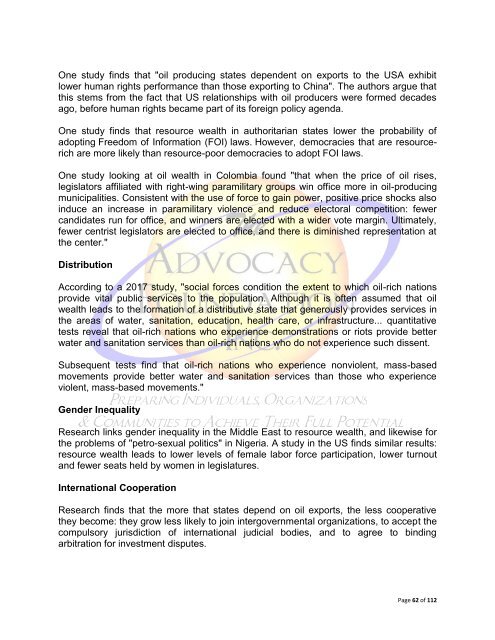De-Industrialization
De-Industrialization
De-Industrialization
Create successful ePaper yourself
Turn your PDF publications into a flip-book with our unique Google optimized e-Paper software.
One study finds that "oil producing states dependent on exports to the USA exhibit<br />
lower human rights performance than those exporting to China". The authors argue that<br />
this stems from the fact that US relationships with oil producers were formed decades<br />
ago, before human rights became part of its foreign policy agenda.<br />
One study finds that resource wealth in authoritarian states lower the probability of<br />
adopting Freedom of Information (FOI) laws. However, democracies that are resourcerich<br />
are more likely than resource-poor democracies to adopt FOI laws.<br />
One study looking at oil wealth in Colombia found "that when the price of oil rises,<br />
legislators affiliated with right-wing paramilitary groups win office more in oil-producing<br />
municipalities. Consistent with the use of force to gain power, positive price shocks also<br />
induce an increase in paramilitary violence and reduce electoral competition: fewer<br />
candidates run for office, and winners are elected with a wider vote margin. Ultimately,<br />
fewer centrist legislators are elected to office, and there is diminished representation at<br />
the center."<br />
Distribution<br />
According to a 2017 study, "social forces condition the extent to which oil-rich nations<br />
provide vital public services to the population. Although it is often assumed that oil<br />
wealth leads to the formation of a distributive state that generously provides services in<br />
the areas of water, sanitation, education, health care, or infrastructure... quantitative<br />
tests reveal that oil-rich nations who experience demonstrations or riots provide better<br />
water and sanitation services than oil-rich nations who do not experience such dissent.<br />
Subsequent tests find that oil-rich nations who experience nonviolent, mass-based<br />
movements provide better water and sanitation services than those who experience<br />
violent, mass-based movements."<br />
Gender Inequality<br />
Research links gender inequality in the Middle East to resource wealth, and likewise for<br />
the problems of "petro-sexual politics" in Nigeria. A study in the US finds similar results:<br />
resource wealth leads to lower levels of female labor force participation, lower turnout<br />
and fewer seats held by women in legislatures.<br />
International Cooperation<br />
Research finds that the more that states depend on oil exports, the less cooperative<br />
they become: they grow less likely to join intergovernmental organizations, to accept the<br />
compulsory jurisdiction of international judicial bodies, and to agree to binding<br />
arbitration for investment disputes.<br />
Page 62 of 112

















